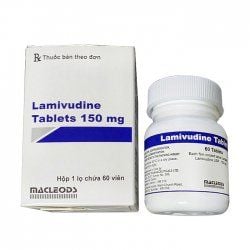This is an automatically translated article.
Contains the main ingredient, Entecavir (in the form of Entecavir monohydrate) with a concentration of 0.5mg - belongs to the antiviral group. Baetervir is used to treat chronic hepatitis B virus infection. In addition, the drug is also used in cirrhosis, especially decompensated cirrhosis.
1. What is Baetervir?
Baetervir is a brand name of the active ingredient Entecavir that is only used when prescribed by a doctor. The drug is prepared in the form of film-coated tablets (box of 3 blisters x 10 tablets).
Each Baetervir tablet contains 0.5mg of Entecavir (as Entecavir monohydrate) and some other excipients just enough.
2. Baetervir medicinal uses
The drug is used primarily for the treatment of chronic hepatitis B virus infection, with evidence of viral replication activity or persistent elevations of serum aminotransferases (AST/SGOT or ALT/SGPT). Or in the case of active tissue disease. Including patients who are resistant to lamivudine.Entecavir is a synthetic guanine derivative with activity against hepatitis B virus. The mechanism of action is that the drug is phosphorylated by cellular enzymes to form an active metabolite - entecavir triphosphate. By competing with the natural substrate deoxyguanosin triphosphate, it inhibits the hepatitis B virus's DNA polymerase. Therefore, it blocks all stages of enzyme activity.
3. Instructions for using Baetervir
Should be taken with water and on an empty stomach, at least 2 hours after eating and 2 hours before the next meal. The recommended dosage is based on the target population:
In adults and adolescents 16 years of age and older with chronic hepatitis B virus infection and who have not used nucleosides: 0.5 mg orally once daily. In adults and adolescents 16 years of age and older with a history of hepatitis B virus infection while taking lamivudine or with lamivudine resistance mutations: 1 mg orally once daily. Decompensated liver disease: Oral dose of 1mg, 1 time per day. For pregnant women and lactating women: The drug can be transported across the placenta, affecting the fetus and excreted in milk, affecting the baby, so it should not be used in these subjects. You should consult with your doctor for advice on appropriate medications and treatments. Children under 16 years of age: The drug should not be used as safety and efficacy have not been established. You should consult with your doctor for advice on appropriate medications and treatments. Note that the duration of taking the drug can last from 1 to 2 years, depending on the condition and disease condition. Therefore, try to adhere to the treatment prescribed by the doctor, do not arbitrarily stop the drug without permission. In patients with cirrhosis, especially with decompensated cirrhosis, drug discontinuation is generally not recommended.
Before prescribing Baetervir, tell your doctor if you have a known hypersensitivity to Entecavir or to any of the other ingredients.
No dose adjustment is necessary in patients with hepatic impairment. However, there have been few cases of death from severe fatty liver disease following the use of the drug or some cases of acute hepatitis B exacerbation in patients who have discontinued anti-hepatitis B therapy. , including treatment with Entecavir. Therefore, patients should be closely monitored for liver function for at least several months after discontinuation of the drug. In addition, a careful dose adjustment is required in patients with renal impairment with creatinine clearance < 50 ml/min, including patients on hemodialysis or continuous peritoneal dialysis.
Do not use the drug for people who do jobs that involve driving or operating machinery.
When overdose of Baetervir, patients may experience liver and kidney toxicity, it is best to be taken to the nearest medical facility for proper treatment according to the regimen.
In case of missed dose, try to take it as soon as you remember. However, if it is almost time for the next dose, skip the missed dose and take the next dose at the designated time. Absolutely do not take the combined dose.
Do not tear the medicine packaging, store at a temperature below 30oC and in a dry place, protected from light. If the medicine shows any signs of deterioration, changes color, or becomes watery, discard the tablet and replace it with a new one.
4. Drug interactions and side effects of Baetervir
4.1 Drug Interactions Since Entecavir is eliminated primarily by the kidneys, co-administration with drugs that impair renal function or compete for excretion with Entecavir may increase serum concentrations of the drug.
In addition, Entecavir can also cause interactions with the following drugs, although not significantly:
Lamivudin. Adefovir. Dipivoxil. Tenofovir disoproxil fumarate. 4.2 Side effects Possible side effects of Baetervir may include:
Lactic acidosis, causing symptoms such as numbness or coldness in the hands and feet, shortness of breath, muscle pain or weakness, dizziness , frequent fatigue, feeling weak, stomach pain, slow and irregular heartbeat. Fatty liver. Headache. Nausea and vomiting. Fever. Diarrhea. Undigested. Insomnia. Dreamy. Increased liver enzymes, especially after stopping treatment. Jaundice . Rash. Hair loss. When experiencing any serious condition, the patient should be taken to the hospital as soon as possible.
The above are the uses of the drug Baetervir patients should refer to for the most effective and safe medication process.













